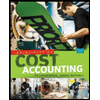Many producers of complex products actually combine manufacturing processes with assembly duties. This means that they make some parts of the finished goods inventory, but they also purchase manufactured components from other manufacturers to include in their products. For example, an automobile manufacturer may purchase rolls of steel and manufacture the shell of the vehicle (hoods, fenders, and so forth). Auto makers also purchase some vehicle parts completed by other manufacturers to produce a finished vehicle. Car makers purchase tires, airbags, windshields, and many other components in their finished state to complete a vehicle. Discuss how you would determine the standard cost and actual cost of finished vehicle produced by a car maker that both manufactures its own parts and assembles parts manufactured by other companies.
Many producers of complex products actually combine manufacturing processes with assembly duties. This means that they make some parts of the finished goods inventory, but they also purchase manufactured components from other manufacturers to include in their products. For example, an automobile manufacturer may purchase rolls of steel and manufacture the shell of the vehicle (hoods, fenders, and so forth). Auto makers also purchase some vehicle parts completed by other manufacturers to produce a finished vehicle. Car makers purchase tires, airbags, windshields, and many other components in their finished state to complete a vehicle. Discuss how you would determine the
Let's not go onto Chegg and us an answer from there! I already asked this question on Bartleby... but unfortunately the person used an answer from Chegg for my question! SMH
A standard cost is an expected cost that a company establishes at the beginning of a fiscal year for prices paid and amounts used. The standard cost is the amount of money that is expected to be spent on materials or labor rates. The standard quantity is the expected number of items or labor hours. Standard costing is the practice of substituting an expected cost for an actual cost in accounting records. The differences between expected and actual costs are then documented. Because standard costs differ slightly from actual costs, the cost accountant calculates variances on a regular basis to account for distinctions caused by factors such as labor rate changes and material costs.
Step by step
Solved in 2 steps








